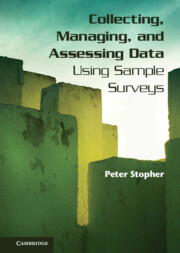Book contents
- Frontmatter
- Contents
- Figures
- Tables
- Acknowledgements
- 1 Introduction
- 2 Basic statistics and probability
- 3 Basic issues in surveys
- 4 Ethics of surveys of human populations
- 5 Designing a survey
- 6 Methods for conducting surveys of human populations
- 7 Focus groups
- 8 Design of survey instruments
- 9 Design of questions and question wording
- 10 Special issues for qualitative and preference surveys
- 11 Design of data collection procedures
- 12 Pilot surveys and pretests
- 13 Sample design and sampling
- 14 Repetitive surveys
- 15 Survey economics
- 16 Survey implementation
- 17 Web-based surveys
- 18 Coding and data entry
- 19 Data expansion and weighting
- 20 Nonresponse
- 21 Measuring data quality
- 22 Future directions in survey procedures
- 23 Documenting and archiving
- References
- Index
19 - Data expansion and weighting
Published online by Cambridge University Press: 05 June 2012
- Frontmatter
- Contents
- Figures
- Tables
- Acknowledgements
- 1 Introduction
- 2 Basic statistics and probability
- 3 Basic issues in surveys
- 4 Ethics of surveys of human populations
- 5 Designing a survey
- 6 Methods for conducting surveys of human populations
- 7 Focus groups
- 8 Design of survey instruments
- 9 Design of questions and question wording
- 10 Special issues for qualitative and preference surveys
- 11 Design of data collection procedures
- 12 Pilot surveys and pretests
- 13 Sample design and sampling
- 14 Repetitive surveys
- 15 Survey economics
- 16 Survey implementation
- 17 Web-based surveys
- 18 Coding and data entry
- 19 Data expansion and weighting
- 20 Nonresponse
- 21 Measuring data quality
- 22 Future directions in survey procedures
- 23 Documenting and archiving
- References
- Index
Summary
Introduction
Data expansion and data weighting are often considered as part of the same process, but they should in fact be distinguished from one another. Data expansion is simply the procedure of multiplying each observation in the data by a factor that represents how many members of the population are represented by that observation. Data weighting is the procedure of developing multiplication factors that attempt to correct for biases in the sample design that have been introduced, either intentionally or unintentionally, into the sampling and surveying process. Both data expansion and data weighting have, as their principal goal, the purpose of providing as accurate an estimate as possible of population statistics from a sample.
There are many instances in data collection when there is no interest in producing population statistics from the data. In many instances of research and practice that are aimed at developing statistical models of a process, using data collected from a sample, there may be no need or interest to expand the data to the full population. Indeed, it is a property of a number of modelling procedures that, provided an appropriate specification of the model is utilised, biases in the data will not affect most of the estimated parameters of the model, so that neither weighting nor expansion of the data are necessary. This is true, for example, for choice modelling using the method called multinomial logit analysis (Manski and Lerman, 1977; Stopher and Meyburg, 1979), in which, provided that a full set of alternative-specific constants are specified, the coefficients of all model variables will be unbiased estimators, even if the input data are significantly biased. Further, in this particular case, alternative-specific constants that are incorrectly estimated can be corrected through a simple process (Manski and Lerman, 1977).
Information
- Type
- Chapter
- Information
- Collecting, Managing, and Assessing Data Using Sample Surveys , pp. 418 - 430Publisher: Cambridge University PressPrint publication year: 2012
Accessibility standard: Unknown
Why this information is here
This section outlines the accessibility features of this content - including support for screen readers, full keyboard navigation and high-contrast display options. This may not be relevant for you.Accessibility Information
- 1
- Cited by
